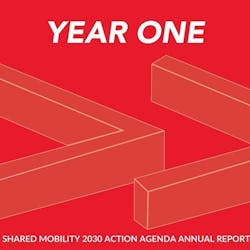Shared Mobility 2030 Action Agenda Network releases its inaugural Shared Mobility 2030 Action Agenda Annual Report
The Shared Mobility 2030 Action Agenda Network has published its inaugural Shared Mobility 2030 Action Agenda Annual Report, showcasing collaborative action and accountability in creating a more sustainable and equitable future with shared mobility. The network is comprised of 70-plus cross-sector organizations and convened by the Shared-Use Mobility Center (SUMC).
The report features the commitments, actions and achievements of individual members and is a key component of the Shared Mobility 2030 Action Agenda, which mobilizes and holds the sector accountable to the ambitious goal of making shared mobility more reliable, easier to use, available, equitable, accessible and affordable than driving a car. Action and accountability are the cornerstones for the agenda to incite tangible and meaningful change.
"As the world wrestles to decarbonize transportation—one of the biggest contributors to the GHGs driving anthropogenic climate change—electrification has become the go-to strategy but electrification by itself won't address the much harder systemic problems of inequality, safety and affordability that are endemic to our car-centric mobility systems," said SUMC CEO Benjamin de la Peña. "The annual report showcases how the sector is stepping up to go beyond the EV. The Action Agenda Network members know meaningful change goes beyond tailpipe emissions. We need more shared mobility, more public transportation, more active choices and safe sidewalks if we are to get to a just transition."
To hold the network accountable, SUMC administered a self-assessment tool that surveyed members' in-house programs confronting the climate crisis, addressing community inequities and improving transportation affordability. Responses unveil innovations and best practices while fostering a commitment to uphold their words and continuously enhance the network's efforts. The tool will continue to evolve each year to better track the shared impact of the members.
"We need more transportation options. We need to expand and electrify transit networks and promote alternatives to single-occupancy vehicles. We need to significantly reduce carbon emissions and pollution through city-led, transformative climate action, which is why we support the Action Agenda and are a member of the Action Network," said Nick Sifuentes, director of Sustainable Cities Program, Summit Foundation.
The report also showcases the network's collaborative action through roadmaps developed by working groups for individual action items, covering topics ranging from creating foundational technology and tracking carbon reduction to establishing an equity database and new funding mechanisms. Each roadmap lays the groundwork for clear, ready-to-be-funded projects that the network agrees need immediate action to realize the bigger vision of the Action Agenda. The roadmaps' projects are foundational activities that can be accomplished in 12 to 18 months.
"The urgency of the climate crisis, the urgency of equity and racial justice and the burdens on our households demands that we act together and hold ourselves accountable. Access to opportunity in the U.S. is deeply inequitable because of unjust, historical barriers based on race, gender, culture and identity," said Stephanie Lotshaw, executive director, TransitCenter. "We need to secure a more just and sustainable future with abundant public transportation options and more shared mobility."
The Action Agenda Network plans to continue evolving the agenda and releasing annual reports to track progress and drive collective action among members, which include public transit agencies, government departments, shared mobility companies, funders, nonprofits and advocates. The Shared Mobility 2030 Action Agenda serves as a framework for addressing climate change, social inequity and accessibility challenges through seven key action items.
